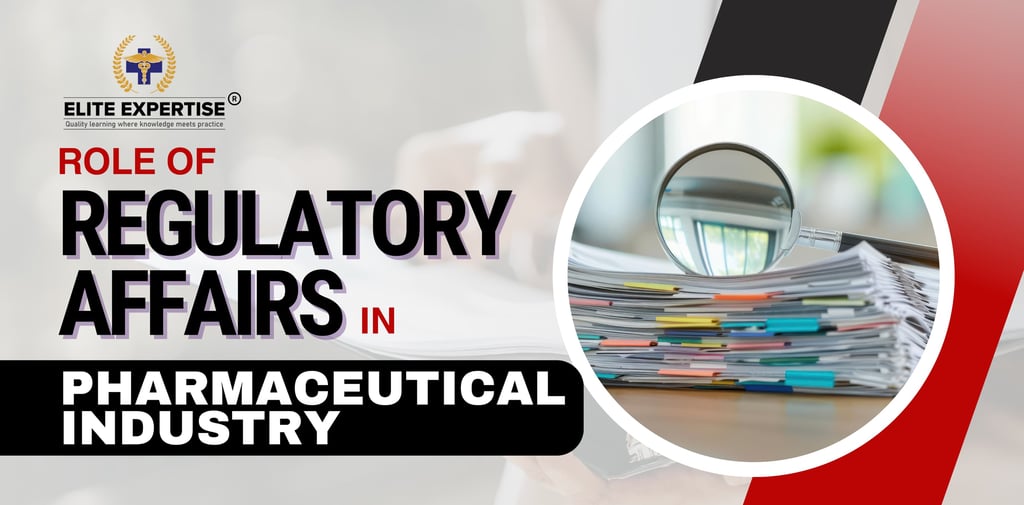ASK MY PHARMACIST | GOT QUESTIONS? Your pharmacist has answers. Click Here
Role of Regulatory Affairs in Pharmaceutical Industry
Regulatory Affairs is essential in bringing safe and effective medicines to patients. From the early stages of drug development to final approval and commercialization, Regulatory Affairs professionals play a key role in ensuring compliance with regulations, preventing delays, and maintaining product quality.
Sahana
2/7/20252 min read


What is Regulatory Affairs?
Regulatory Affairs (RA) is a very important department in the pharmaceutical industry which ensures that drugs developed are safe, effective, and abide all legal requirements before finally reaching patients. The Regulatory Affairs department serves as a link between the pharmaceutical companies and regulatory bodies, like the Therapeutic Goods Administration (TGA) in Australia, the Food and Drug Administration (FDA) in the U.S., and the European Medicines Agency (EMA) in Europe.
Why is Regulatory Affairs Important?
The process of developing a new drug or medicine is a very lengthy and costly process, which might take approximately 10 to 15 years (This tenure may vary with various conditions pertaining to that drug). Regulatory affairs experts support pharmaceutical companies in overcoming complex legal and scientific challenges, ensuring the effective development, testing, and approval of drugs. The unnecessary delays, increasing costs and slowing down access to important medicines in the drug approval process are all avoided with the Regulatory Affairs in place.
Role of Regulatory Affairs in Drug Development
1. Research & Development (R&D) Stage:
In the intial stages of the drug development the Regulatory Affairs team collaborates with scientists to ensure that new drug candidates meet the legal and safety requirements. They assist in designing clinical trials to evaluate the effectiveness of the drug and its safety in humans.
2. Clinical Trials:
Before entering into the market for the patient use the drug or new medicine enters into various phases of Clinical trials.
Phase I: A small group of people for safety is tested in this phase.
Phase II: Tests a larger group to check how well the drug works
Phase III: Involves thousands of patients to confirm safety and effectiveness.
Here the Regulatory Affairs makes sure that guidelines set by health authorities are met in the clinical trials performed.
3. Marketing Authorization:
In case of the success of a clinical trial, the companies must apply for drug approval. The Regulatory agencies or bodies require a few documents to be submitted to prove the safety and efficacy of the medicine developed where Regulatory Affairs professionals pitch in and submit the required documents for it.
4. Post-Approval & Commercialization:
Once a drug is approved, Regulatory Affairs continues to play a vital role by:
Tracking the drug's safety through continuous studies.
Verifying that any alterations in manufacturing or packaging comply with regulatory guidelines.
Reporting any new uses or formulations to the relevant regulatory authorities.
Conclusion
Regulatory Affairs is essential in bringing safe and effective medicines to patients. From the early stages of drug development to final approval and commercialization, Regulatory Affairs professionals play a key role in ensuring compliance with regulations, preventing delays, and maintaining product quality. Their expertise helps pharmaceutical companies successfully navigate complex legal requirements while making life-saving medicines available to people worldwide.
Follow Us
+91 76750 84909
Privacy Policy | © 2025 Elite Expertise . All Rights Reserved.
ELITE EXPERTISE PTY. LTD (ABN: 15668292439) (ACN: 668292439)
Australian Statutory Education License: OPP 2025 ELITE EXPERTISE PTY. LTD
Disclaimer
Elite Expertise is an online education platform dedicated solely to providing coaching and preparation services for the OPRA, PEBC, PSI and PTE exams. We do not offer any sponsorship or migration services. All information provided on our platform is for educational purposes only and should not be interpreted as legal or immigration advice. For inquiries regarding sponsorship, visa applications, or migration services, please consult with licensed immigration professionals or relevant authorities.
Elite Expertise is a trusted and results-driven training platform specializing in preparation for international pharmacist licensing exams. Our comprehensive courses, expert instructors, and proven methodologies have helped countless pharmacy professionals achieve their goals and succeed in competitive regulatory exams. We are proud of our strong success rate and commitment to excellence.
Elite Expertise is an independent training provider. We are not affiliated with any global pharmacy regulatory authorities or official exam-conducting bodies.
Copyright © 2026 Elite Expertise. All rights reserved.
Address
Unit 1/73 Beverley St, Doncaster East VIC 3109, Australia
